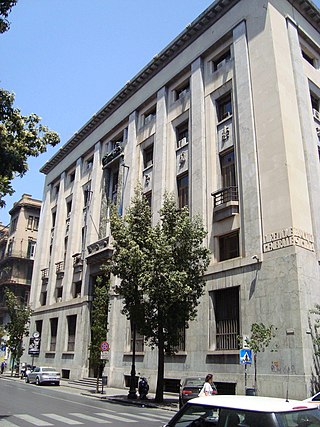
UniCredit S.p.A. is an Italian multinational banking group headquartered in Milan. It is a systemically important bank and the world's 34th largest by assets. It was formed through the merger of Credito Italiano and Unicredito in 1998 but has a corporate identity stretching back to its first foundation in 1870 as Banca di Genova. UniCredit is listed on the Borsa Italiana and Frankfurt Stock Exchange and is a constituent stock of the Euro Stoxx 50 index of leading shares.

Banco di Sicilia was an Italian bank based in Palermo, Sicily. It was a subsidiary of UniCredit but absorbed into the parent company in 2010.

Banca Popolare di Milano S.p.A. also known as Bipiemme or just BPM is an Italian bank based in Milan, Lombardy. The bank is a wholly owned subsidiary of Banco BPM. Banca Popolare di Milano S.c. a r.l., an urban area cooperative bank, was founded in 1865, however, due to the merger and the foundation of Banco BPM, the original branches of BPM as well as some businesses were injected into another legal person and BPM's subsidiary Banca Popolare di Mantova, which was renamed to Banca Popolare di Milano S.p.A. on 1 January 2017.
Banca Popolare or Banca del Popolo may refer to several Italian banks:

Credito Italiano, often referred to by the shorthand Credit, was a significant Italian bank based in Milan. It was established in 1895, succeeding the Banca di Genova established in 1870 in Genoa. In 1998 it merged with Unicredito to form Unicredito Italiano, later known as UniCredit.

Banca Commerciale Italiana, founded in 1894, was a major Italian bank based in Milan. In 1999, it merged with the group recently formed by the combination of Cassa di Risparmio delle Provincie Lombarde and Banco Ambroveneto to form IntesaBCI, in which BCI temporarily became a sub-holding company. On 1 January 2003, the group's name changed to Banca Intesa, later Intesa Sanpaolo.
The Raiffeisen Landesbank Südtirol – Cassa Centrale Raiffeisen dell'Alto Adige is the central banking institute of the 39 independent cooperative Casse Rurali/Raiffeisenbank in South Tyrol, Italy.
EBA Clearing is a provider of pan-European payment infrastructure wholly owned by shareholders that consist of major European banks. It derives its name from the Euro Banking Association which was instrumental in its establishment in June 1998, but has always been a separate organization.
The Savings Bank of the Province of Bolzano / South Tyrol is an Italian savings bank based in Bolzano, the capital of South Tyrol autonomous region.
Banco Popolare Siciliano is a brand used by Banco Popolare in Sicily.

Nexi S.p.A. formerly known as Istituto Centrale delle Banche Popolari Italiane S.p.A. (ICBPI) is an Italian bank that specialises in payment systems such as Nexi Payments. The bank was specialised as a central institution of Italian Popular Bank.
Credito Siciliano was an Italian bank headquartered in Acireale, Sicily and previously Palermo. It was a subsidiary of Credito Valtellinese until its merger by incorporation into Credito Valtellinese in June 2018.
ICCREA Group, known formerly as Istituto Centrale delle Casse Rurali ed Artigiane, is a central institution of Italian credit unions and rural savings banks. The holding company of the group was ICCREA Holding, while ICCREA Banca, ICCREA BancaImpresa, and several other companies were subsidiaries. However, ICCREA Banca merged with ICCREA Holding in mid-2016 as part of the banking reform in Italy. The co-operative banks of Italy would create strong central banks with power to recapitalize individual co-operative banks.
Atlante is an Italian banking sector owned bail-out equity fund that is dedicated to recapitalize some Italian banks, as well as purchase the securities of the junior tranches of non-performing loans. It was established in 2015 in response to the Italian bad debt crisis of that year. The fund was under regulation by the EU Alternative Investment Fund Managers Directive.
Banca Popolare Sant'Angelo S.C.p.A. is an Italian cooperative bank based in Licata and Palermo, the capital of Sicily. The bank also has one branch in Lampedusa, the south most island of Italy and also has a branch in Rome.

Banco BPM S.p.A. is an Italian bank that commenced operations on 1 January 2017, by the merger of Banco Popolare and Banca Popolare di Milano (BPM). The bank is the third largest retail and corporate banking conglomerate in Italy, behind Intesa Sanpaolo and UniCredit. The bank has dual headquarters in Verona and Milan respectively.
Cassa di Risparmio di Verona, Vicenza, Belluno e Ancona, also known by the shorthand Cariverona, was an Italian savings bank headquartered in Verona. It was formed in 1825 from a division of the Monte di Pietà di Verona, itself founded in 1490.

Cassa di Risparmio della Marca Trivigiana, also known as Cassamarca in short, was an Italian savings bank headquartered in Treviso, Veneto. The history of the bank goes back to 1496 when the charitable institution Monte di Pietà di Treviso was founded. The savings bank was established by the Monte in 1907, following a first bank spinoff in 1822 that ended up being absorbed in 1872 by the Cassa di Risparmio delle Provincie Lombarde.








